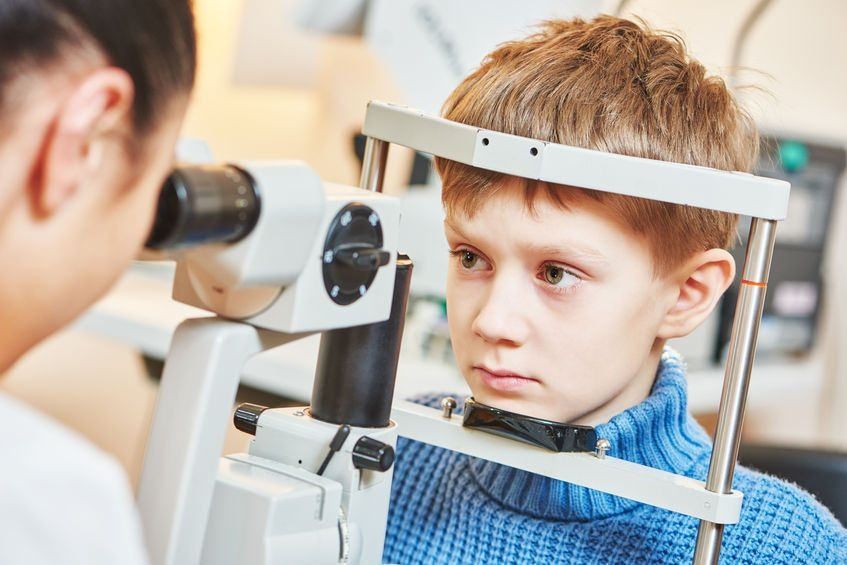How to become the smartest: ranking of the best books for increasing erudition in 2020

An erudite is always an educated person, but not every educated person is an erudite. Who can be considered an educated person? In explanatory dictionaries, Wikipedia on this topic, there is an absolute confusion of opinions. Perhaps, having become an erudite, you will be able to put an end to this question. Now only one thing is clear: an educated person is literate, distinguished by a culture of behavior, vocabulary, has a broad outlook, in-depth professional knowledge of a higher level of education. And special books will help to become more erudite.
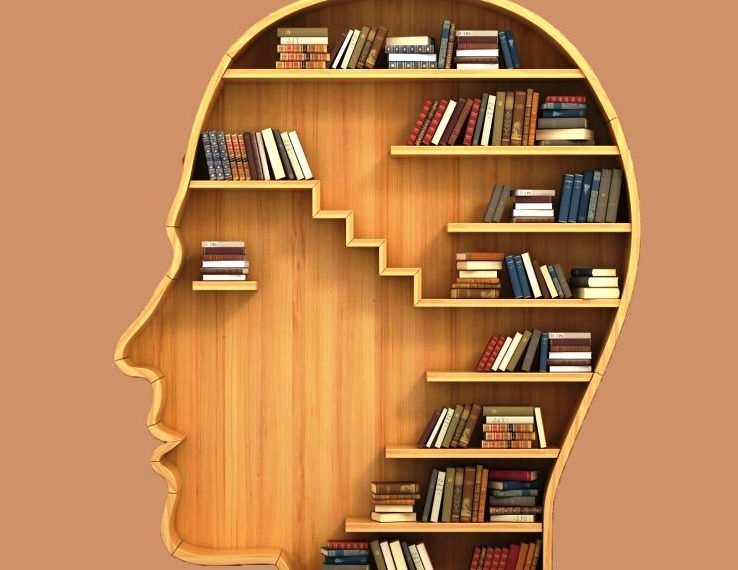
Is there any benefit from erudition
Erudition is a higher level concept. Translated from Latin, this word means a scientist who has overcome rudeness and ignorance. An erudite person, in contrast to an educated one, has a wider outlook, he absorbs knowledge through books, research, analysis, not through manuals and textbooks on the subject. Erudition appears on the basis of education, constant reading, personal understanding of the sources read. A person who has a breadth of knowledge that allows a person to improve, at the same time rejects primitivism in explaining the structure of the world, helps the development of society.

Some of the participants in the debate on the topic "Do we need erudition" consider the redundancy of knowledge harmful. They call erudition "an abstruse hobby" that is not applicable in everyday life. Knowledge collectors, they say, read everything indiscriminately, most of this knowledge will never be useful to anyone. Most likely, this part of the disputants has little in common with educated people. The flip side of high education is ignorance, with such baggage the bright future really becomes ghostly and unreal.
What gives erudition:
- the ability not only to study a subject, but to generate something new, to make discoveries;
- organize technological breakthroughs, ensure technical progress;
- studying the issue from different sources allows you to compare, assess the accuracy and accuracy of the knowledge gained;
- personal growth, intellectual development, memory training, logic.
The most famous parable that emphasizes the need for erudition is about the dispute between four blind people telling what an elephant looks like. There is a sculpture in Bonn: each of the blind is holding on to a separate part - a leg, a trunk, a tail, a torso. And they describe the elephant precisely by their feelings: a pole, a hose, a string, a soft wall. The elephant does not work until all their images are combined together. This will be the scientific objectivity that erudites have to a greater extent.
How to become an erudite
In everyday perception, erudition is knowledge that can be shared with others. But getting this knowledge by reading everything that comes to hand will not work. Cramming to remember is also not an option. The main thing in this matter is not the amount of read, memorized facts, but the ability to analyze, compare, critically evaluate, check the information received. But you must read it. What and how much - now we will tell you.
- Better to start with a topic that is closer. First, try to become a polymath in your field. When your peers recognize you as a polymath, you can move on to another area of interest.
- You can improve your level with the help of encyclopedias. Big Soviet, for example, or thematic, there are many of them on different topics for different age groups. They are brief, succinct, but quite a lot of knowledge on any range of issues.
- There is a special training of erudites according to the method of the game “What? Where? When?" It assumes a seemingly strange, but in fact a very interesting list of works that really increase erudition.
- For two decades, non-fiction book fairs have been held in Russia - a term that distinguishes the sector of non-fiction, scientific, applied subjects in literature. If you want to show off the breadth of your horizons, then you need to read non-fiction. This includes dictionaries, memoirs, popular science literature, cookbooks - all sources of information that carry facts, not speculation.
The ability to analyze includes checking the sources of information, invoices. Having facts from different sources on one topic, possessing knowledge, the ability to think logically, you can become an erudite in a specific direction - science, religion, politics, etc.
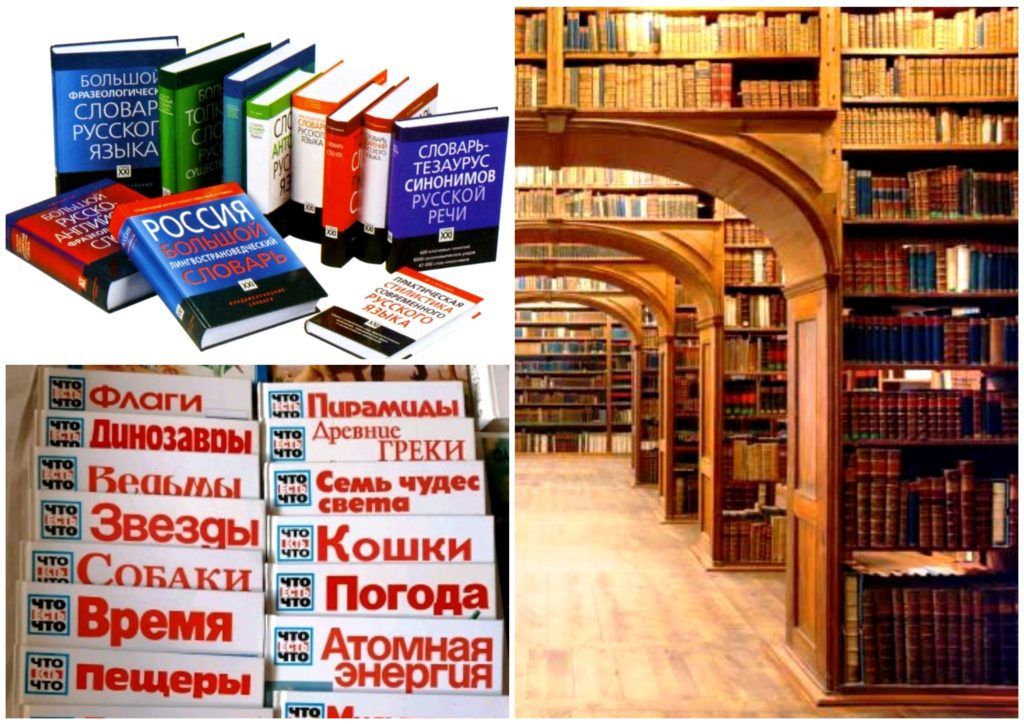
Why non-fiction is good
A well-educated person begins not with nuclear physics, but with fiction. For the development of intelligence, it is a very important stage. Knowing the classics when communicating with others will immediately betray your education. Further, erudition rests on popular science and scientific literature, which has an antagonistic definition - non-fiction (non-fiction). This part of the literature includes:
- journalism;
- popular science publications;
- encyclopedias, dictionaries, reference books;
- biographies, memoirs;
- religion;
- psychology;
- self-knowledge, self-development,
- art, culture;
- sports, health.
Of course, not funny "popular pictures" from a series of how to quickly lose weight or get rich from an unknown Imarek, but written by professionals, experts in their field. The current shaft of printed materials does not have time to study, analyze, and check.Some people trust false information without having time to verify the accuracy. True scholars will never appreciate a fact from one source of information. They will read a few, find inconsistencies, get a real version of the event. Because they look at the elephant as a whole, it means they know how to analyze.
Non-fiction of the XX International Book Fair
It is difficult to make a list of the best books for the development of erudition, because this is a purely individual question. But experts of the largest Russian Book Fair may well advise.

Gregory Burns. What does it mean to be a dog. And other discoveries in animal neuroscience
Per. from English I. Evstigneeva. M .: Alpina Non-Fikshn, 2020.333 p.
RUB 489 - RUB 547
Scientists study animals in an attempt to discover cognitive abilities. The stories of scientific experiments on dogs, dolphins, and fur seals are presented by one of these scientists. Does the dog understand what color is called blue? What is "here" and "there" - we understand, but the seals? Scientific research is always a difficult but interesting process. Having taught dogs not to be afraid of a tomograph, the scientist told what was going on in the dog's head. Seals understand musical rhythm, dolphins “see” with ultrasound. All have human-like feelings.
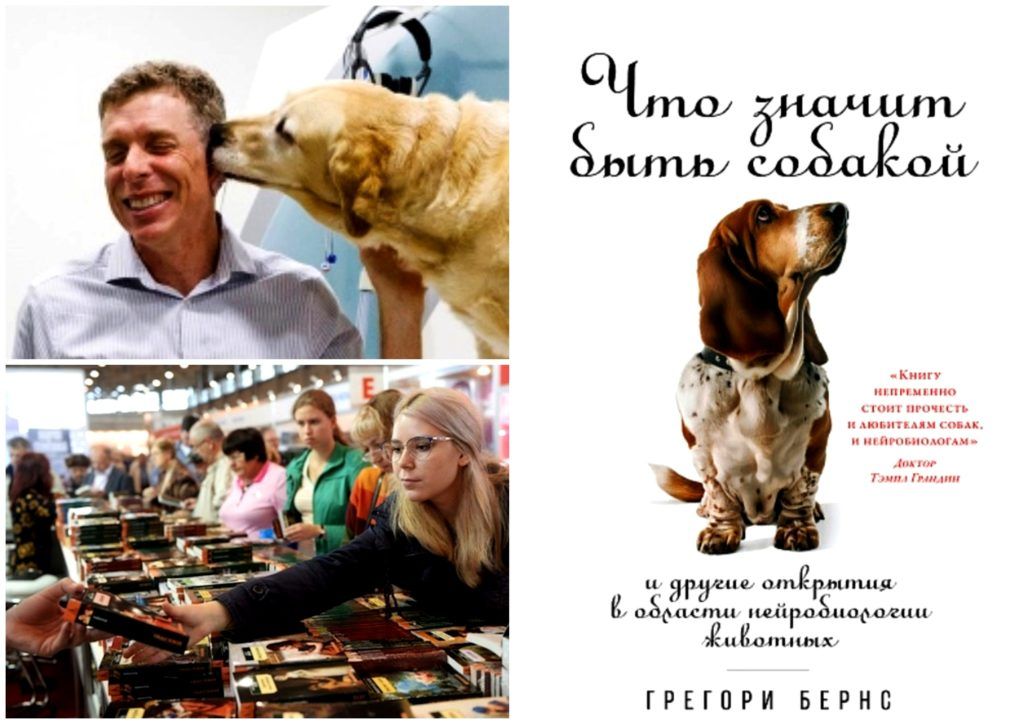
- the author seeks to show that the animal world plays an important role in the life of the planet. They only lack speech skills, otherwise they see, feel, rejoice, like people.
- laboratory experiments on animals cannot be popularized, this is mockery of animals.
Lyalya Kandaurova. Half an hour of music. How to understand and love the classics
Moscow: Alpina Publisher, 2018.438 pp.
499 - 504 rubles.
For generations that grew up after Perestroika, the author-musicologist explains the essence of classical music. Easy-to-read formatting in four parts. What do the original names mean, read it yourself, it is not written cleverly, it is easy to read, interesting. The author twists the plot like a film detective, intricate, mysterious, fascinating. Any play that is described can be downloaded from the Internet by code and listened to. Knowing the history of creation, the principles of collecting notes in bars, it becomes much more interesting to listen to.
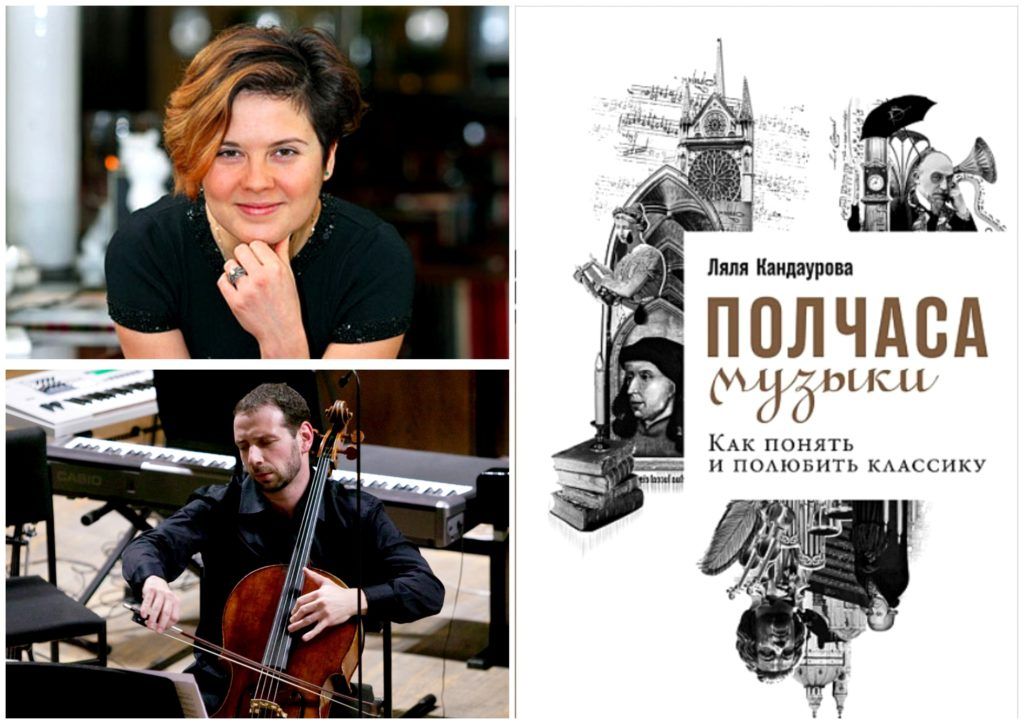
- thanks to the author: I discovered Okegem's polyphony;
- qr codes - listening to the work about which it is written is a good plus.
- graduated from a music school, but it was difficult to maneuver among the variety of terms.
Dilshat Harman, Mikhail Maizuls, Sergey Zotov. Suffering Middle Ages
M .: AST, 2018.416 pp.
RUB 457 - 696
A rare example when the Internet public (community of history lovers - half a million subscribers) became a bestseller. Here you will find explanations for the marginalities in the margins of the manuscripts and frescoes of the Middle Ages, strange, sometimes completely obscene. Monkeys in the margins of ancient manuscripts, obscene figures on church walls - why such sacrilege? 600 illustrations, excellently composed text, seasoned with humor - such a historical thing has turned out. Educational character, innovative ideas, made it controversial for scientists, but one of the most widely read historical publications.
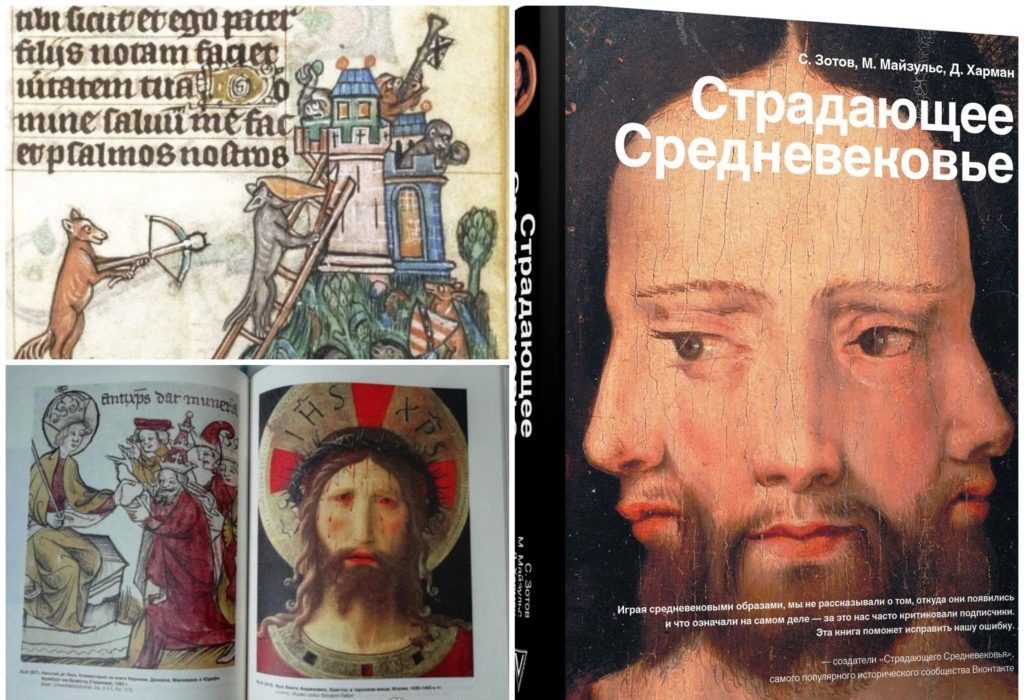
- it turned out to be a solid encyclopedia of medieval icon painting for those who only belong to the topic, not for professionals;
- half a thousand illustrations is cool: European, Christian painting (Catholics, Protestants, Lutherans); the main goal - to unravel the symbolism of medieval paintings, was successfully completed.
- often the image is not on the page where it is mentioned, this is annoying;
- frivolous pictures, their meaning helps the authors to understand, but there is nothing about the technique of drawing, color symbolism.
Non-fiction Book Fair "Red Square"
The selection from the "Popular Science Book" series was made up of publications that were in high demand at the fair, and the literary critic-expert liked it.

Richard Dawkins. Selfish gene
Publisher: Gorpus, translation by N. Fomina, 2013.512 pages.
564 - 576 rubles
The author's first book (1976) remains the most widely read of all his works. It is a masterpiece of literature and biology, published in 20 languages. Well illustrated, it talks about evolution and genetics. What is obvious to biologists will be a discovery for the “non-biological layman”. Informative, interesting: we will walk with the author in time from insect to human, talk about the strategies of nature, behavioral characteristics, the "cultural revolution".
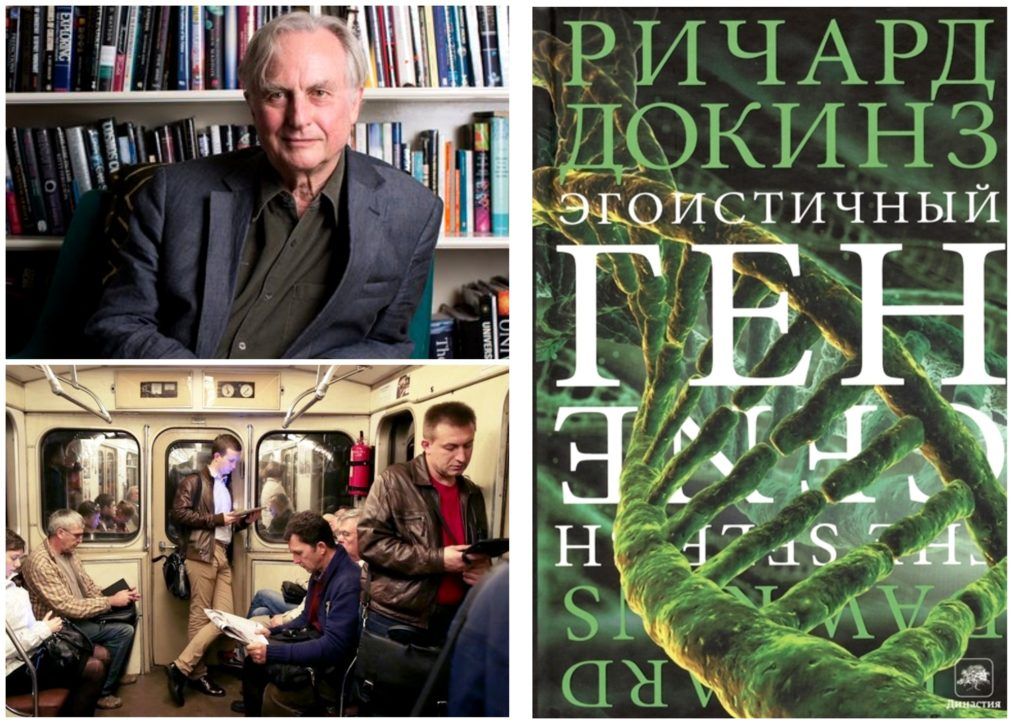
- the author is a wonderful conversationalist, smart, subtle, just talks about difficult things;
- we are biological machines - tough but honest;
- serious scientific work, controversial, but presented at a very accessible level;
- even for one hundred percent humanities it was too tough.
- absolutely no illustrations, diagrams, graphics.
Diana Halpern. Psychology of critical thinking
Publishing House PETER. Series: Masters of Psychology, 2000.512 pp.
Electronic version, download for 240 rubles, 512 pages.
The electronic version is downloaded free of charge, 158 pages.
Serious work on cognitive psychology, informal logic, in which there is a lot of psychological research. Interesting descriptions of delusions - logical and intuitive, options for analyzing argumentation, tools for developing effective thinking, many other issues related to logic, memory, brain function. A good guide for those who want to think modernly will help in self-education.
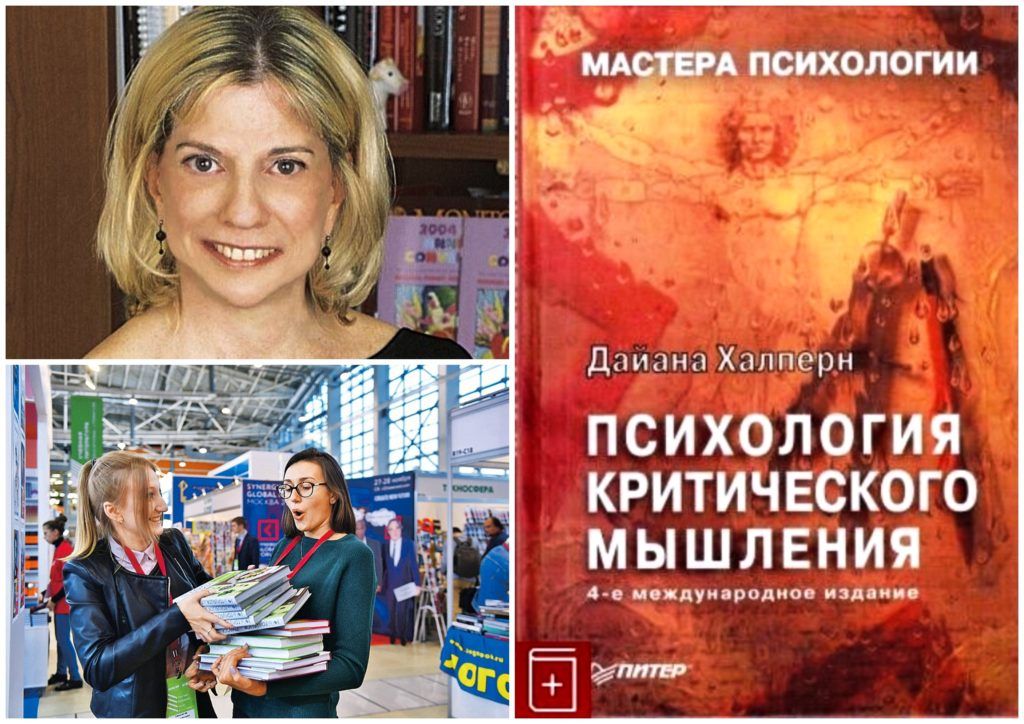
- the structure of the text is correct - from simple to complex, each chapter is as an independent work, at the end - conclusions, terms, it is very convenient to study;
- a lot of quotes, examples, tasks - the head is working, it is not just read diagonally;
- real research, practical application prompted - excellent.
- not found.
David Edmonds. Would you kill the fat man?
Gaidar Institute Publishing House. 2016.256 pp.
Philosophical work on ethics - “what is good and what is bad”. A subtle science, with a mass of contradictions, paradoxes, is described by the author with knowledge of the matter. It is easy to read, gives a lot of useful knowledge. An ethical dilemma: are you ready to push one fat man onto the rails in order to save five tied to the same rails? Questions of the moral philosophy of "walking on corpses" or universal love have always been interested in precisely the complexity of the choice.
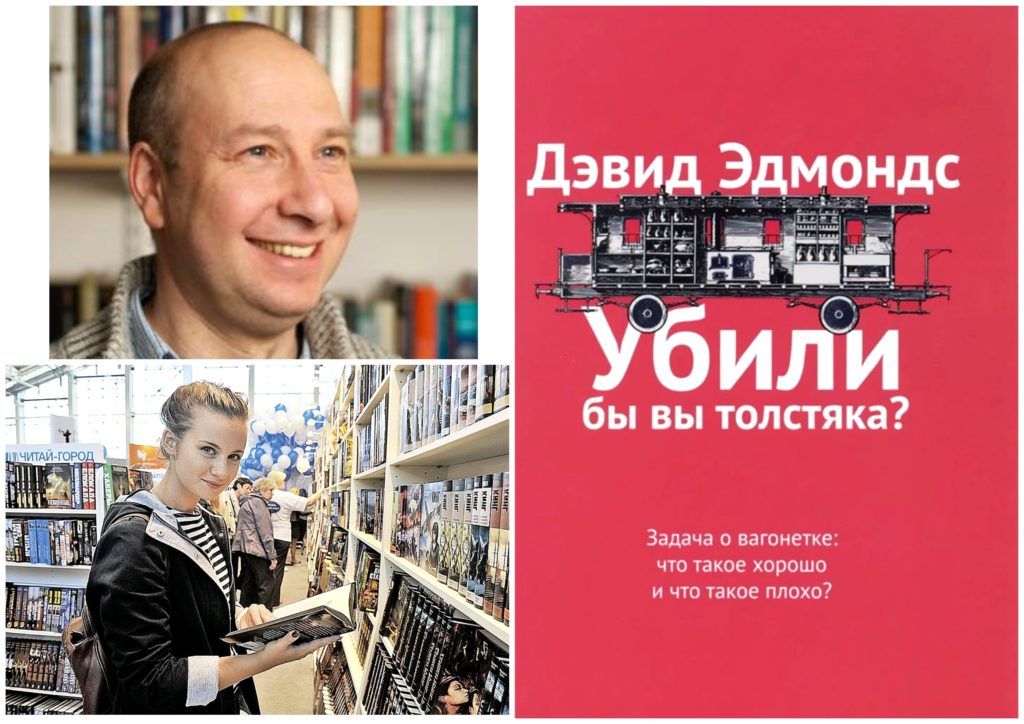
- excellent narrative structure, easy to read, interesting;
- cognitive: it hooks on the fact that there is no "correct" answer to some questions, both are wrong.
- a lot has been written about the "trolley problem", an important point, but it is only a stepping stone to the main topic;
- for some reason, the author delved into the personal life of women philosophers, not at all on the topic, but the analysis of the problem is not enough.
TOP 7 best books that improve erudition
When in the TV game “What? Where? When?" the team gives the correct answer to a question that is indirectly related to science, history, the audience is simply amazed: ridiculous topics, and experts answer. Because there are no stupid questions for them. It is also important to know who eats bees, how a lemon changes the color of tea, because there are laws of physics and chemistry, logical chains, interconnection with space.
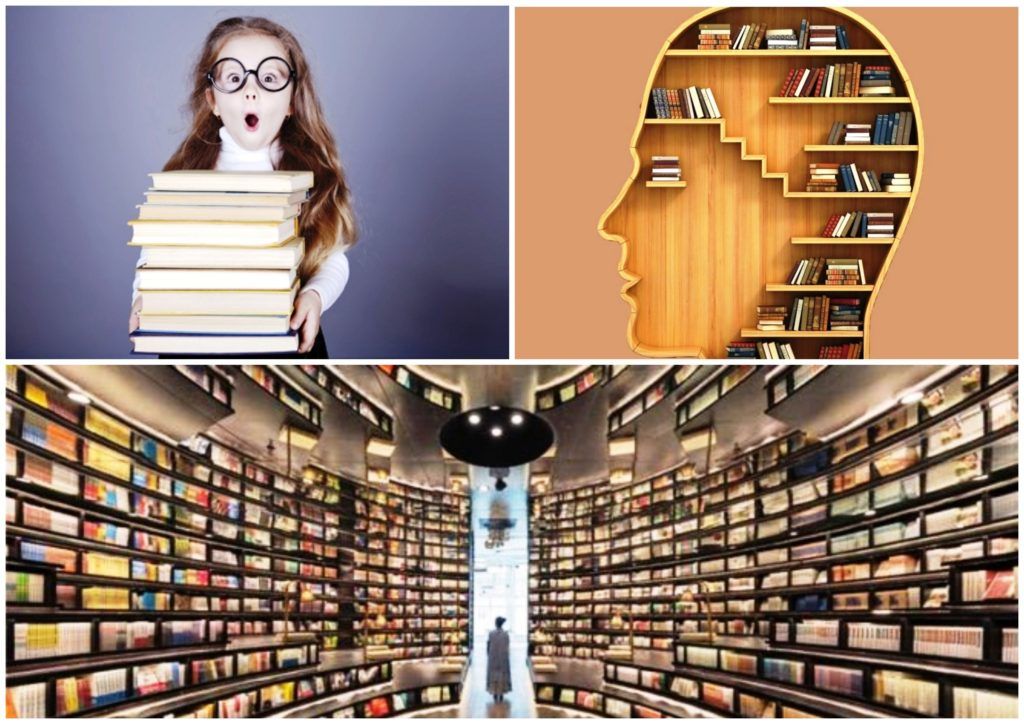
- most of the books in this direction give answers to numerous questions, becoming a starting point for a serious study of other issues, and the outlook is expanding;
- almost all authors cover topics with humor, but behind every word there is scientific confirmation or generally accepted opinion;
- each author is a scientist with his own theories, discoveries, and very useful publications.
- in most books on this topic there are few illustrations, but there are many specific terms that make it difficult to understand the essence.
Bill Bryson. A Brief History of Almost Everything
Publisher: AST. Series: Civilization: birth, life, death. Translated by V. Mikhailov, 2016. 608 pp.
584 - 644 pp.
A completely unusual encyclopedia about various fields of science - from Darwin's theory to black holes. She received an award for her contribution to the development of science. It is already a bestseller in America. The author strove to prove that it is possible to tell about complex things simply, then knowledge will be gained easily, without straining to exact calculations. As a result, it was written in unscientific language for the average reader who wants to expand his horizons. But external ease of reading does not mean entertainment topics.
If you are interested in a topic, you will quickly find more serious publications about it. From simple to complex - quite a productive way of acquiring knowledge, developing erudition. The encyclopedia, by the way, deals with the development of the Universe, civilizations, human nature, the most important world discoveries.
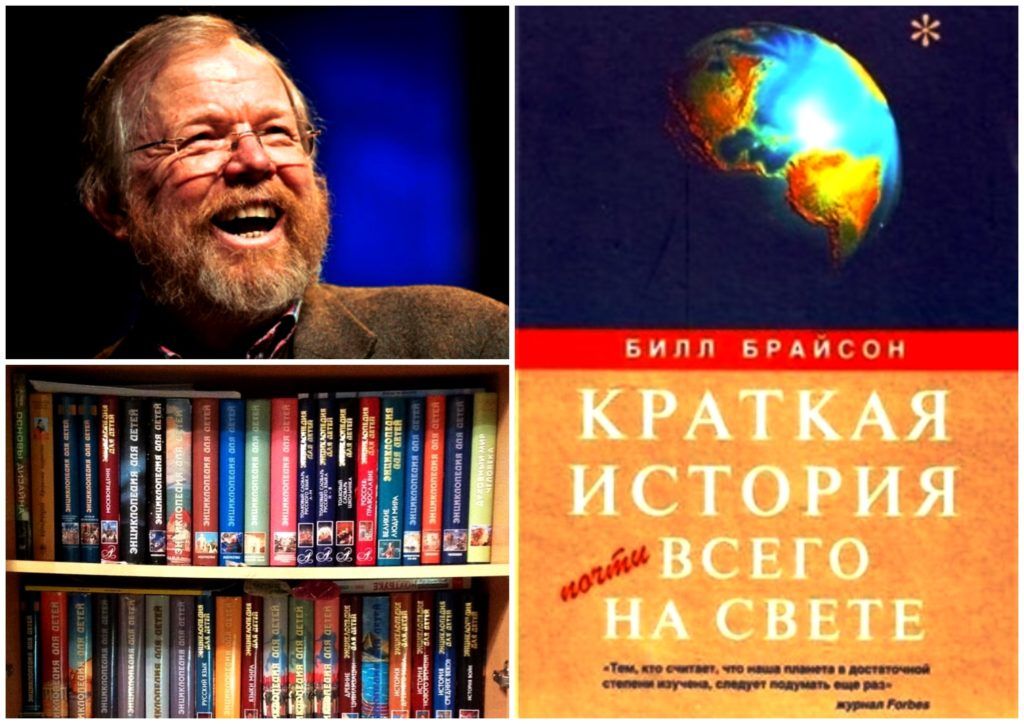
Stephen Juan. The oddities of our body
Publisher: Ripol-Classic. Series: The Unusual in the Usual. Translated by A. Davydova, A. Romanov. 2016.560 pp.
386 r
Primitive school anatomy does not give a complete picture of our body. The author tells with knowledge of the matter and a sense of humor about how the most complex mechanism works inside, what processes take place in it. How a person is born and dies, the likelihood of accidents, their consequences - complex, but important for the perception of oneself in this world, issues are covered without tragedy, popularly, with ease. Dwarfs, giants, genetic anomalies, diseases, longevity - the author tells about all this and much more.
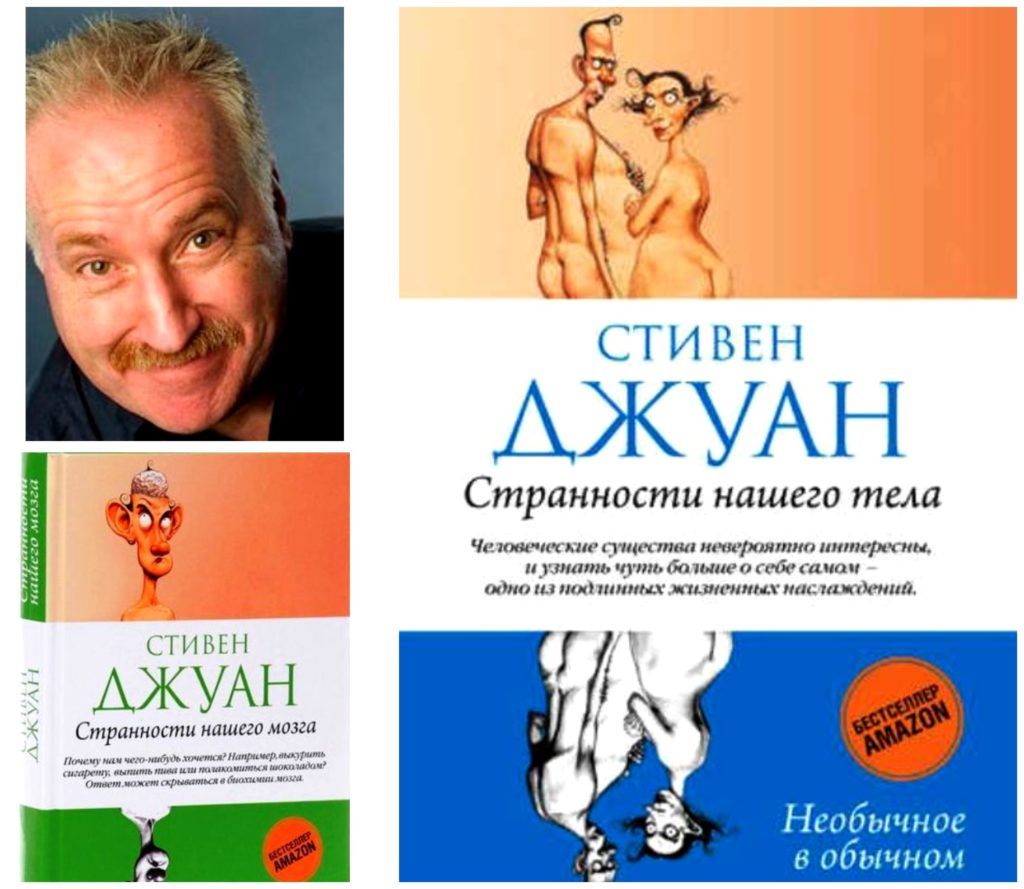
John Lloyd, John Mitchinson. Book of common delusions
Publisher: Phantom Press. Series: Book of General Delusions. Translated by A. Rakhuba. 2012.384 p.
304 RUB
People are very often mistaken, because knowledge is relative, facts can be misinterpreted, literature is mostly useless. General delusion gives rise to fear of recognition and is consolidated as the norm. This is what the authors are thinking about. Easy syllable, read with interest. It will be very useful for erudites: 320 questions, most of which are in IQ tests, have been analyzed in detail and explained.
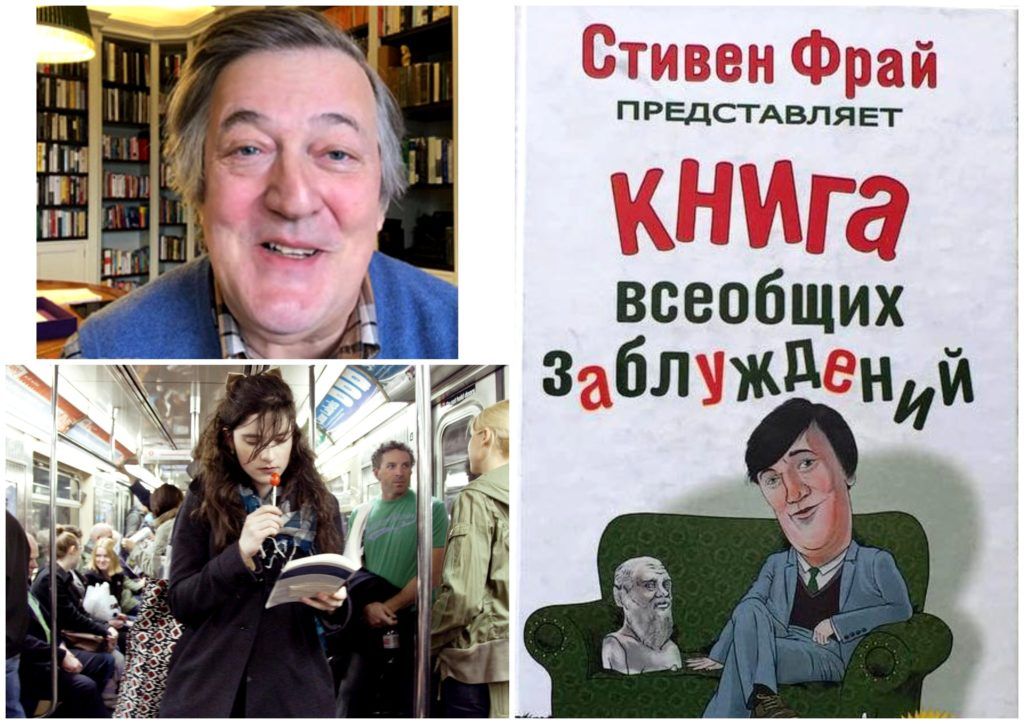
Robert Enwood. Why bears don't run downhill and 200 more interesting facts that require explanation
Publisher: Good book. Series: Books for the curious. 2010.320 p.
276 - 470 rubles.
The author collected incredible, ridiculous, interesting stories, beliefs, questions in pubs, on the streets, in stores. Having studied the topic comprehensively, he found a well-grounded answer, made it out in an easy popular form. Yes, dogs don't need to be treated to chocolate. No, a person's height is not a constant, in the evening it is 2 cm lower than in the morning. Do guinea pigs have sweat? Isn't it stupid questions, but the answers, having a scientific background, send erudites to various sections of anatomy, physics, genetics. And this is not at all nonsense.
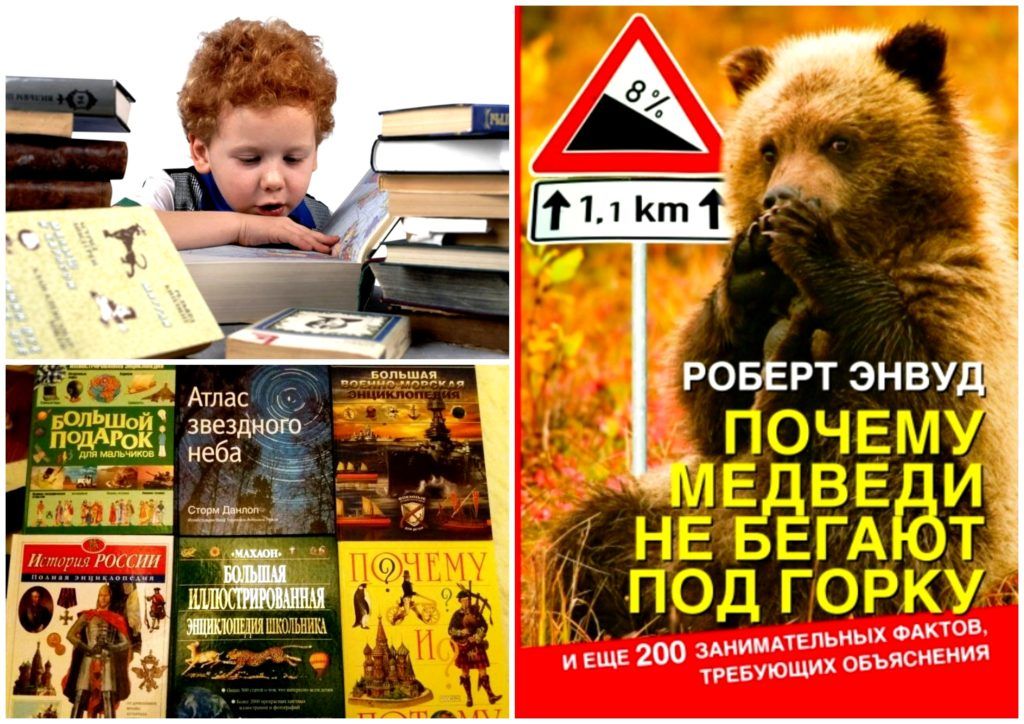
Augustus Brown. Why the panda stands on its head and other interesting stories
Publisher: CoLibri. Series: Galileo. Translated by V. Svechnikov. 2010.384 p.
206 r
It is very useful for erudition to have knowledge about our smaller brothers. The amazing world of animals can not only surprise with their skills, abilities, but show human habits. Or is it man adopted from animals? They, it turns out, also have problems of fathers and children, there are parties, games of "mafia". It is written with humor, reads easily, surprises from the first page.

Mick O'Hare. Who eats bees? 101 answers to seemingly stupid questions
Publisher: Ripol-Classic. Translation by I.Novoseletskaya. 2007. 256 pages
The electronic version is downloaded free of charge.
The author's surname in social networks is written in different ways: Hayer, Khara, Khair. He loves unusual, ridiculous questions, is happy to look for answers to them that can surprise and enlighten you. His presentation style is popular with readers of all ages. After reading the answers, you can show off interesting facts in the company.
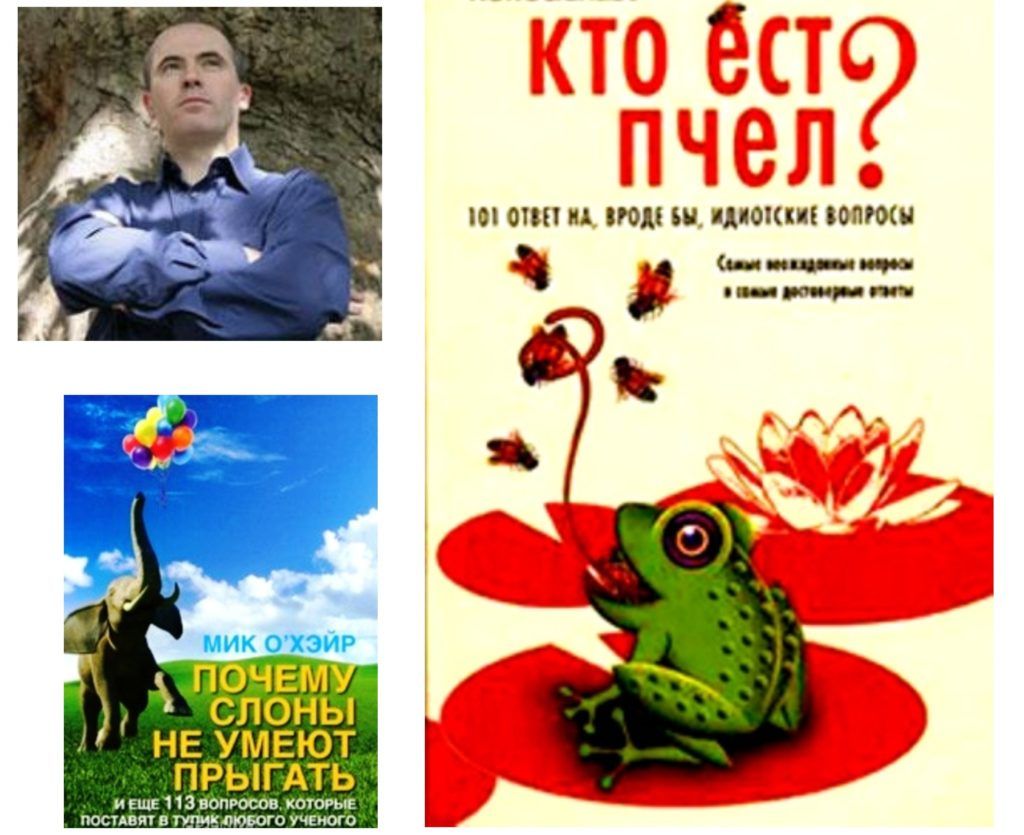
Mick O'Hare. Why elephants can't jump and 113 more questions that will baffle any scientist
Publisher: Good book. Series: How and Why. 2011.256 pp.
271 - 303 rubles.
Continuation of the previous one. Again strange and funny questions, clever professional answers. The author is the chief editor of a popular scientific journal, where subscribers send their questions. Here you will find stories about the amount of memory a person has, what is the height of a butterfly's flight, why the face bends when eating acidic food. Elephants don't jump, and sparrows can't walk - that's a paradox! We are looking for answers.
TOP-5: Train the brain
Any human organ requires nutrition, training. Our brain is trained through the thought process. Reflections, memories, make him work, without work he atrophies. As cynics joke: the gyrus will straighten - there will be nothing to think with. This cannot happen for true scholars, for them a real pleasure is to train the process of thinking. For them, the following list.
Stanislav Müller. Unlock your mind: become a genius
Publisher: Peter. Series: Himself a psychologist. 2009.192 pp.
RUB 85
The electronic version is downloaded free of charge (available for 55 rubles)
A practicing psychologist believes that anyone can easily become a genius. The question is the speed of perception of a skill or knowledge. The average person's brain works by 3-5%, in a talented person - by 10%. How to activate cells so that a person becomes a genius? There are control technologies that trigger "super-learning" in any person. Read, learn to pump your brain, increase intelligence, erudition. Super thinking, super memory technologies - look here.
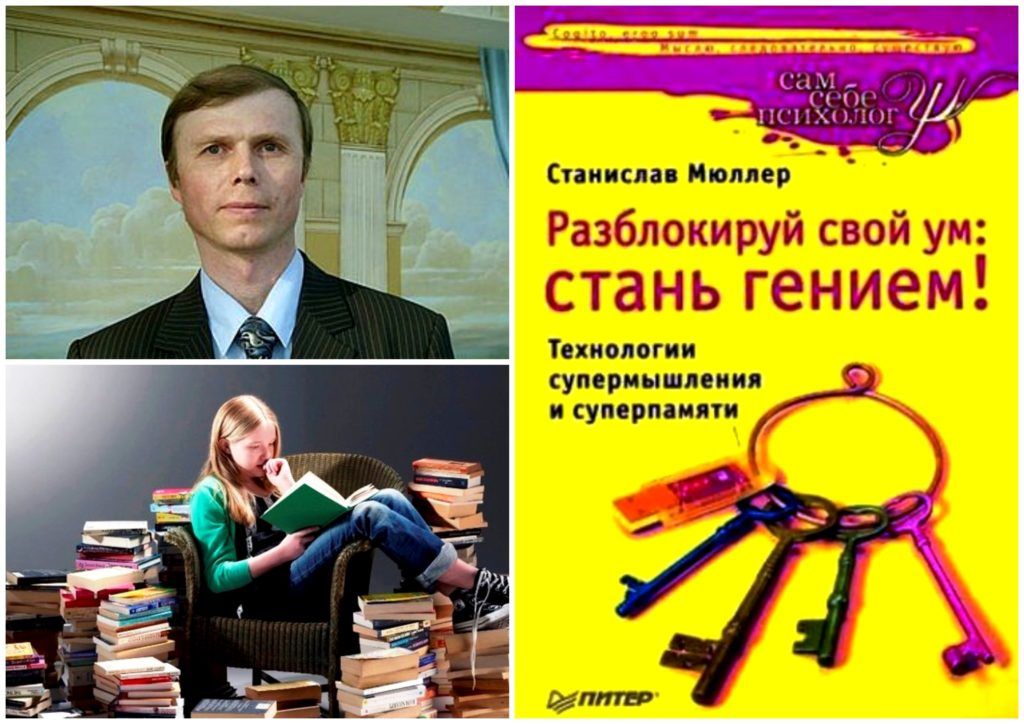
- if you do not expect an instant positive effect from the method, understand the area of application, then many basic abilities can be unlocked.
- activation of the potential was not achieved, it did not work.
Edward de Bono. Teach Yourself to Think: A Self-Study Guide for Developing Thinking
Publisher: Potpourri, LLC. Translated by A. Kurskov. 2010.288 pp.
274 r
The brain is a memory machine, but it can be trained by turning it into a mechanism for processing accumulated experience, making it not only accumulate memories and skills, but also create something new. The author has developed a technology for improving the brain. Only five stages, passing which, you are threatened with genius.

- easy to read, understanding the program is not difficult;
- the author proposes to reevaluate your thought processes, to actively begin to train your memory, to do this always.
- a lot of criticism of Socrates, Aristotle, Plato - that's really in vain;
- more scientific than popular, few examples, many questions.
Tony Buzan. Memory cards. Preparing for exams
Publisher: Rosmen-Press. Translation by O. Panova. 2007.120 p.
192 RUB
The Super Thinking series is an unconventional, but very simple method of working with memory. Buzan's method helps to activate the brain, expand its capabilities, which will lead to a more effective thinking process, increase intelligence, and expand erudition. Fast brain work will increase productivity, reduce the time to work on a task. The bestseller today has become a reference book not only in education and science; this method is actively used in business.
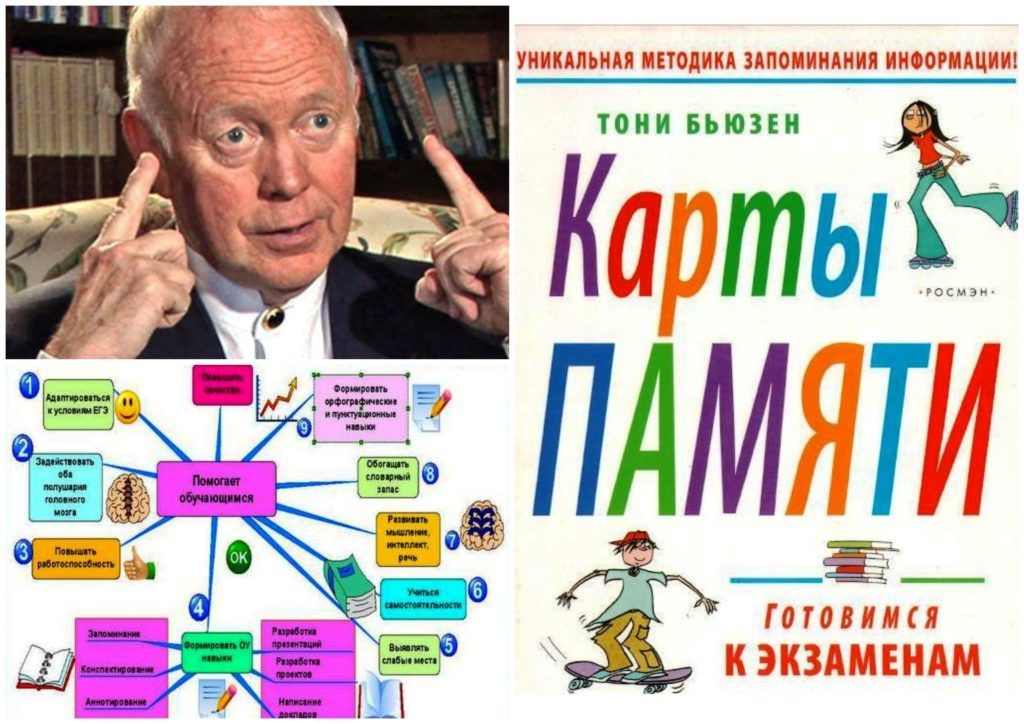
- there is no better manual for the capabilities of the brain;
- useful for those who work with a large amount of information;
- well written, easy to learn, found a new way of memorizing.
- a lot of water, manner of presentation - around and around;
- graphics, drawings are almost all black and white, not cheerful.
Tony Buzan, Michael J. Gelb. Learn to learn or juggle
Publisher: Potpourri. Series: Success! 200.176 pp.
RUB 160
The electronic version is downloaded free of charge.
You can strengthen the potential of the brain using the author's technology by Buzan and Gelb by reading this book. The program, developed by the authors, takes into account the work of the body and brain at the same time. The technique has been tested by participants in numerous seminars, in the field of higher education, business structures, and the army. The result was impressive, because many people expand the capabilities of the brain with the help of this program.
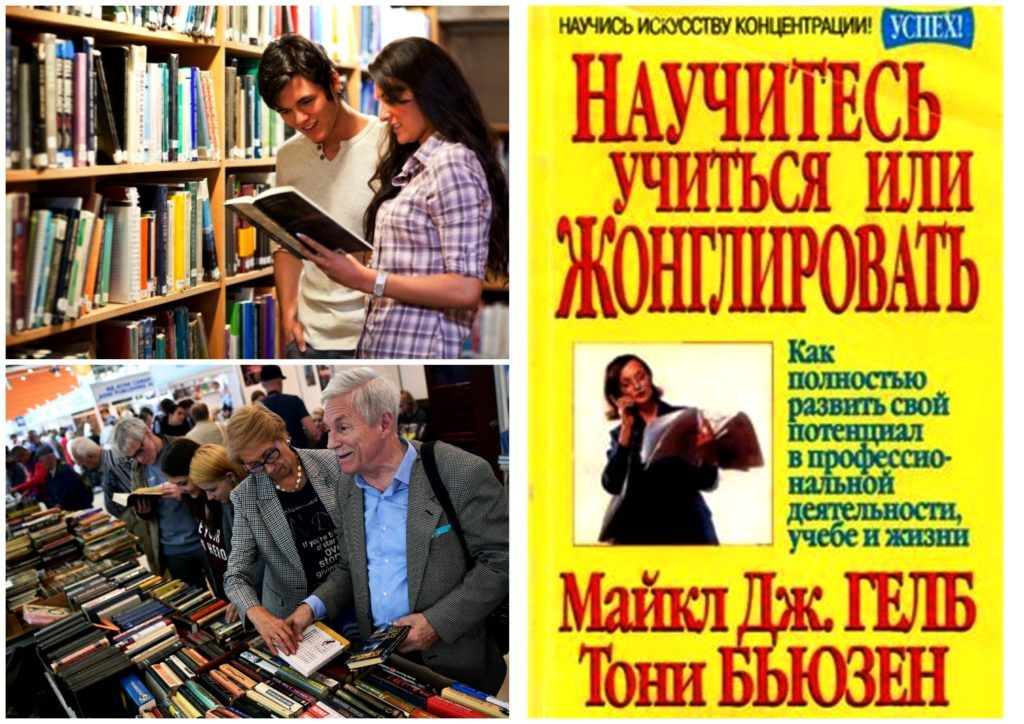
- systemically, disaggregated, structurally - just the perfect guide;
- especially necessary for those who are over 40: in vain you think that memory decays with age.
- will teach you to juggle and ... that's it.
O. A. Andreev. Memory development technique. Self-instruction book
Publisher: Phoenix. Series: Psychological workshop. 2013. 320 pages
144 RUB
Andreev's technology has been tested on thousands of ordinary participants in his lessons and seminars. The author is sure that the initial potential and the age of the student do not play any role. Anyone can make the brain a real biocomputer. Having mastered Andreev's technique, a person will easily assimilate any information, memory will improve, synchronization of consciousness and subconsciousness will occur. Reading speed will increase up to 10 thousand characters. per minute. The intellect will grow accordingly. It is important that Andreev's techniques are patented, have certificates of "Invention", there are several of them - different stages, directions of memory development.
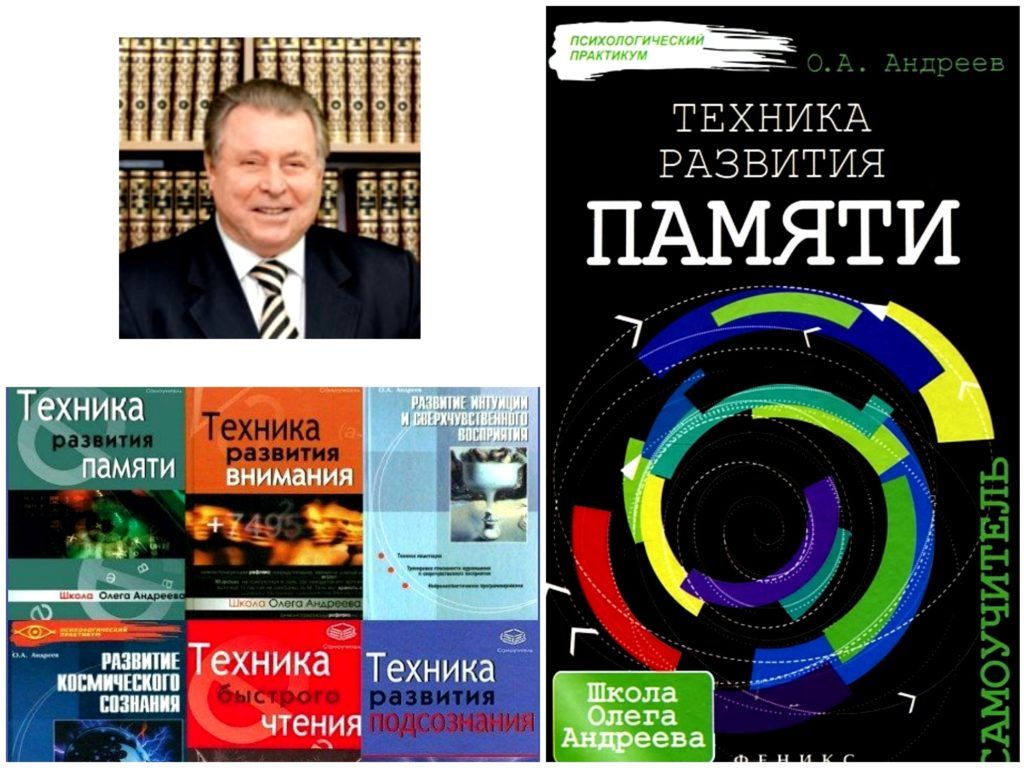
- a lot of useful information, but it takes a lot of time to implement;
- there is a disk, special tables to help.
- an excess of Indian names, yoga poses;
- meditations, asanas require training of the body in themselves, only then can one remember the reason - memory training.
A few simple tips for beginner erudites
If you are interested in accumulating knowledge, analyzing, understanding, knowing more than others about everything in the world, you need to have several mandatory habits.
Save up new words
Study newly heard terms, words. While you were studying at the university, the flow of new concepts was large enough, the brain worked in a good mode. Next, you need to train him on his own so that the creation of neural connections does not stop.
Individual words will not make you an erudite, but behind each word a thread of family ties will be drawn, which you will build and study. Your perception of the world will be more and more subtly structured. The larger the tangle of connections, the faster the simplicity of thinking changes to the cognitive complex.
In practice, it will look something like this:
- learn at least three new words in a week, keep them in memory;
- try to understand an unfamiliar word first without a dictionary, reason logically, try to guess its meaning, then check with dictionaries;
- analyze words that have different effects in different areas: factory reconstruction - reconstruction of a historical event;
- read popular science literature, study terms, try to understand their meaning, connections with other categories, wind a ball of connections around each word.
Updating the thesaurus
Your vocabulary, your storehouse, your thesaurus dictionary. You can expand it by using synonyms in writing and speech. By diversifying speech with words identical in meaning, but different in sound, you replenish your vocabulary. Example: arrived, arrived, arrived, presented, arrived, visited, looked ...
In addition, synonyms often superficially combine concepts, a real scholar can easily explain the difference between a typhoon - a cyclone, a mountain - a hill.
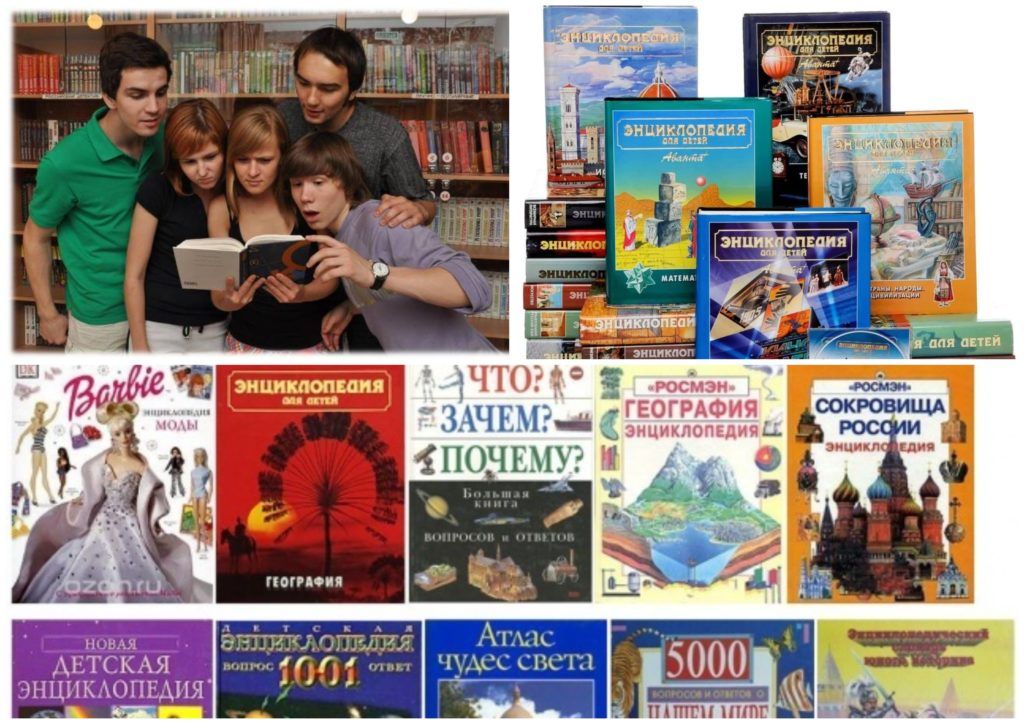
Criticism and analytics
Be sure to read criticism, reviews of specialists, experts about the issue of interest.This is the only way to get an objective picture, and not a personal opinion based on the first impression. By studying the materials on a specific issue, you will get several points of view:
- from the original source;
- personal;
- an expert who knows the topic.
Criticism is helpful in understanding weaknesses. Having three different opinions, one can compare, analyze. With this approach, reading ceases to be a passive assimilation of information, it turns into mental attempts, called comparative analysis.
Write a lot
Written speech is the materialization of your thoughts, a very difficult matter. You need to learn to express thoughts in writing, this will help structure them, build logic. Of course, it is more preferable to write letters to relatives, but on popular science and philosophical topics.
Trying yourself in different sectors of knowledge, you will understand what is your strong point, and where you still need to gain mind.
Read anytime, anywhere
Not detective stories or romance novels, but philosophical treatises, memoirs, scientific articles. Fiction must also be present, but smart, serious, classical. Today you can read e-books downloaded to your tablet, audio versions are available (although they are more difficult to perceive and remember). Reading very productively trains the brain, develops memory, broadens horizons.
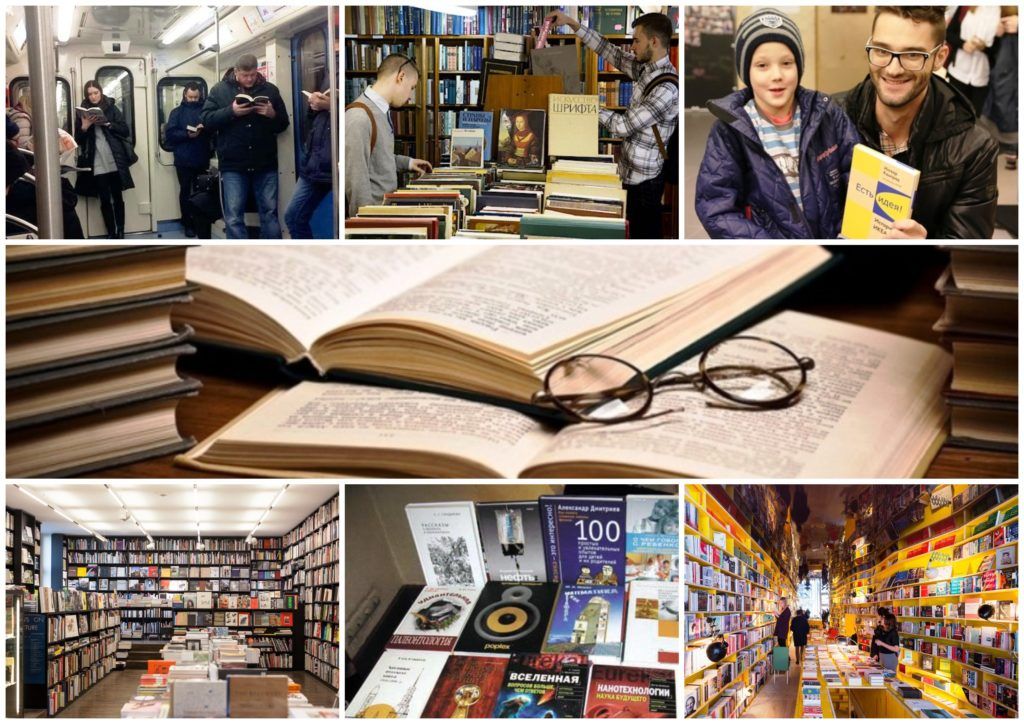
You can talk as much as you like about the Internet search engines, where in a minute there is an answer to any question, but only an erudite is able to give out not just information, but analytics: a complete versatile picture, options for solutions, use, consequences. The Internet is an assistant to the polymath, but is unlikely to replace it in the near future. So - we train memory, replenish vocabulary, move towards perfection!
new entries
Categories
Useful
Popular articles
-

Top rating of the best and inexpensive scooters up to 50 cubic meters in 2020
Views: 97661 -

Rating of the best materials for noise insulation for an apartment in 2020
Views: 95021 -

Rating of cheap analogues of expensive drugs for flu and colds for 2020
Views: 91750 -

The best men's running shoes in 2020
Views: 87680 -

Top ranking of the best smartwatches 2020 - price-quality
Views: 85091 -

Best Complex Vitamins in 2020
Views: 84801 -

The best dye for gray hair - 2020 top ranking
Views: 82406 -

Rating of the best wood paints for interior use in 2020
Views: 77201 -

Ranking of the best action cameras from China in 2020
Views: 75268 -

Rating of the best spinning reels in 2020
Views: 74827 -

The most effective calcium supplements for adults and children in 2020
Views: 72462 -

Top rating of the best means for male potency in 2020 with a description
Views: 68295




